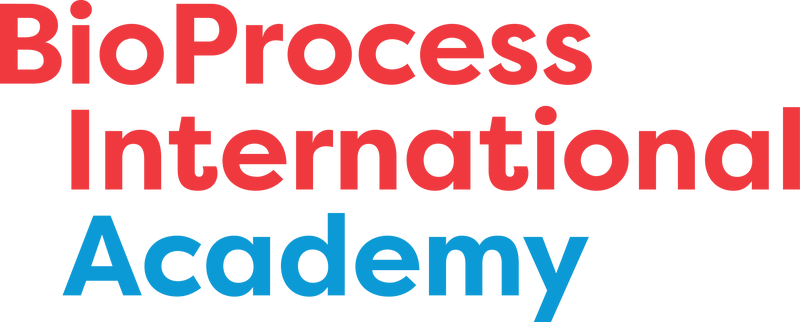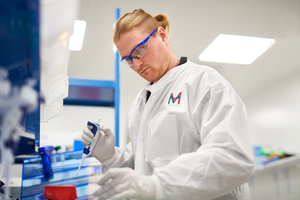The Next Global Life-Science Leader
March 3, 2020

Scientists collaborating in R&D at adMare BioInnovations in Vancouver, BC
Canada’s life-science industry is exceptional at producing innovative research. With less than 0.5% of the world’s population, our country produces 5% of the globe’s total research publications. Canada’s citation rate ranks among the top six nations and is 43% higher than the global average (1). At the same time, our life-science industry is competing with other global jurisdictions into which investment is flowing. The US state of Massachusetts, already the number one biotechnology cluster in the world, has committed US$1.5 billion since 2008 to maintain its dominance. The San Francisco Bay area in California, now the second highest, has kept pace with almost $1 billion in investments (2).
Our federal government has set the lofty goal of becoming a top-three global hub in just six years, and the Canadian life-science industry has joined forces, determined to gain that third spot. The country’s global life-science venture is adMare BioInnovations. We seek to change the landscape of the Canadian life-science ecosystem by sourcing the most therapeutically and commercially promising research from leading academic and biotechnology partners to create companies of scale. That will provide specialized expertise and infrastructure to help existing companies scale up and drive the growth of those companies into Canadian anchors by training the next generation of highly qualified personnel.
Successful Growth Begins with High-Potential Research
Identifying high-potential research is perhaps the most critical step in the adMare process. It begins with foresighting, whereby adMare’s team of experts use numerous means to analyze and evaluate areas of potential commercial opportunity. That enables us to identify those that could hold the most strategic value to us and that could form the basis of a multiasset, financeable company of scale in Canada.
We then carry out a proactive, focused search throughout academia for researchers that might have novel therapeutic approaches that are aligned to the existing or anticipated interests and needs of commercial end users (generally, investors positioned to advance a technology through clinical trials). While implementing this strategic approach, adMare also remains fully open to the presentation of opportunities directly from academic researchers who are wanting to advance their work.
Here are four examples of projects from our robust and therapeutically diverse pipeline, including work from York University in Toronto, ON, the University of Toronto, BC Cancer, and the Ottawa Hospital Research Institute.
Michael Riddell (professor of kinesiology and health science at York University) is an internationally renowned expert on hypoglycemia prevention in people with Type 1 diabetes. As a key academic partner at Zucara Therapeutics, an adMare and Toronto Innovation Acceleration Partners (TIAP) spin-off company, Riddell is fundamental to advancing Zucara’s preclinical research and creating the first treatment to prevent dangerous low blood sugar episodes by restoring diabetics’ ability to counterregulate hypoglycemia.
Thomas Kislinger (professor and chair of medical biophysics at the University of Toronto) is developing novel precision oncology therapies by applying cutting-edge proteomics technologies to identify promising new targets in cancers with high unmet need. Kislinger has partnered with adMare to develop novel antibody-based therapeutics for certain hard-to-treat cancers.
Andrew Minchinton (head of radiation biology at BC Cancer) is developing novel inhibitors of DNA-dependent protein kinase (DNA-PK) as a treatment for a range of cancers in combination with chemo- and radiotherapy. Minchinton has partnered with adMare and LifeArc (UK) to develop drugs suitable for proof-of-concept efficacy studies and subsequent clinical trials.
At the Ottawa Hospital Research Institute, Carolina Ilkow is developing novel oncolytic virotherapies engineered to create a “proimmune” tumor microenvironment and thus promote a potent antitumor immune response. adMare is supporting preclinical profiling of Ilkow’s approaches through specifically developed cellular models and other in vitro efficacy evaluations.
Building the partnerships to find and develop collaboratively such assets requires deep relationships and broad networks, coupled with excellent partnering skills and personal and organizational credibility achieved through a recognized track record of success.
Strategic Collaboration to Create Anchor Companies
The life-science industry is characterized by high risks, high costs, and long development timelines. But it also can be a high-reward sector. Successful commercialization of even a single disruptive technology can have a transformative economic impact, not only on innovators and their investors, but on the entire industry, creating high-retention, high-paying jobs.
Serializing Success: Zymeworks is an excellent example of the transformative effects of successful commercialization. Founded by Ali Tehrani after he completed his doctoral degree at the University of British Columbia, Zymeworks to date has raised nearly $700 million in the past three years.
The company’s ability to attract such investment is built on a combination of its own proprietary work in bispecific antibodies for cancer and an antibody–drug conjugate (ADC) platform spun out from adMare under Kairos Therapeutics. Recognizing the commercial opportunity of ADCs, our team joined forces with John Babcook — a defiantly Canadian serial entrepreneur-scientist — to conceive, develop, and validate the platform. Because Zymeworks was seeking out scale-up capacity to make its pipeline more robust and its business more sustainable, combining forces with Babcook and the Kairos-built platform made considerable sense. The merger of Kairos and Zymeworks created Canada’s largest biologics company in 2016.

The NÉOMED Innovation Centre, a foundation of adMare in Montréal, QC, is a vibrant drug-discovery hub that hosts contract research organizations, biotechnology companies, and specialized commercialization support services and infrastructure.
Making Space for Drug Discovery: Successful drug commercialization begins with collaboration, and collaboration is simpler and more effective in an ecosystem. One foundation of adMare is the NÉOMED Innovation Centre. A vibrant drug- discovery hub hosting contract research organizations (CROs), biotechnology companies, and specialized commercialization support services and infrastructure at state-of-the art facilities in Montréal, NÉOMED offers a dynamic business ecosystem that is stimulating collaboration and innovation and amplifying the global competitiveness of Québec’s life-science companies.
To amplify NÉOMED’s impact, a 50,000-ft2 expansion is slated for completion later this year, and a new accelerator program (with support from the Québec Government and the City of Montréal) will be announced soon. That will provide NÉOMED and broader adMare resources to six of Québec’s most exciting startup companies.
The adMare NÉOMED Innovation Centre clearly is poised to be a thriving focal point for the development of a business ecosystem and innovation networks that will amplify companies’ productivity and ensure that they become more effective and competitive on the global market.
New Company Creation Is a Critical Mission
Directly supporting Canada’s public policy goals, adMare’s primary commercialization efforts are focused on company creation — and on building those companies on a solid foundation so that they have a real chance of staying and growing in Canada. That means forming them on advanced and well-validated academic research with multiple assets in their pipeline, a strong management team already recruited through adMare’s networks, and an adequate level of seed capital to reach subsequent product development and company milestones.
In January, adMare brought Accel-Rx, Canada’s health-science accelerator, under its umbrella. Adding Accel-Rx’s significant expertise and capability in seed-stage investment and entrepreneur development strengthens adMare’s position as a single-stop destination with the necessary scientific, business, infrastructure, and capital resources to grow and scale Canadian health-related companies.
Collectively, adMare and Accel-Rx have helped build companies that are worth over $2 billion and employ more than 700 Canadians. Together, we will stimulate coinvestment from private entities to provide sufficient capital for early stage life-science companies and enable them to create sustainable value in Canada.
We also have developed a partnership with TRIUMF, Canada’s national particle accelerator, working in the field of novel radiopharmaceuticals and targeted alpha therapies to revolutionize the fight against cancer. We are combining the work of leading academic researchers — e.g., François Bénard, vice president of research at BC Cancer, who is making significant contributions to the clinical science of nuclear medicine, cancer imaging, and targeted radionuclide therapy — with TRIUMF’s expertise in manufacturing isotopes and adMare’s ability to identify and validate potential biological targets to develop therapeutic agents. Such collaborations will enable us to create new, targeted therapies for cancers with significant unmet medical need.
Targeted alpha therapy is one of adMare’s key areas of strategic focus and priority, and we ultimately look to leverage and translate the competitive advantage Canada holds in this area into a new company of scale for the country’s life-science industry.
In our industry, consolidation through mergers and acquisitions is a global reality, and not something we expect wholly to change. But with supportive company creation and scale-up programs, we are bridging gaps between academic research, commercialization, and patient care. Doing so will allow Canadian companies to become the large anchors that acquire other companies to fill their innovation pipeline with new assets and technologies, thereby building their own capacity while providing a strong source of funding for the domestic innovation ecosystem. That is how adMare will keep jobs, innovation, intellectual property, and other benefits in Canada, further positioning it on a global scale.
Leadership Training to Keep Canada Globally Competitive
Understanding the need for greater training and leadership in the industry, we developed the adMare Academy to train the next generation of highly qualified personnel to drive the growth of companies into strong anchors.
The Academy currently encompasses three distinct streams: the Executive Institute, the Post-Graduate Institute, and the Undergraduate Institute. Each provides a customized training program to ensure that the Canadian life-science industry has the scientific and managerial talent to lead the world.
To date, more than 250 trainees have completed the Post-Graduate Institute and Undergraduate Institute programs. 96% of Post-Graduate Institute alumni are gainfully employed in their chosen field, having successfully gone on to more than 50 national and international organizations. Those include STEMCELL Technologies, Xenon Pharmaceuticals, BC Cancer, Bristol-Myers Squibb, Boehringer Ingelheim, Johnson & Johnson, GlaxoSmithKline, and the Ontario Institute for Cancer Research.
The adMare Executive Institute — showcasing a great collaboration with and a $1 million contribution from Pfizer Canada — is a one-of-a-kind 10-month program open to a maximum of 20 executive-level life-science professionals annually. The program is delivered in collaboration with global training leaders at the not-for-profit Center for Creative Leadership (CCL). Leadership training is the CCL’s sole focus — and has been for the past 50 years. Because of its track record, it has ranked among the world’s top five institutions for executive education by Bloomberg Businessweek (3) and the Financial Times (4).
Following remarkable success with the first cohort, adMare commenced the Executive Institute’s second cohort in September. That group of future Canadian life-science leaders is set to graduate in April. From Vancouver to Québec City, and from biotechnology research organizations to small and medium-size enterprises as well as multinational corporations, the second cohort contains 18 individuals (10 women and 8 men) who have demonstrated experience and accomplishments in the life-science industry and who are ready to develop the skills necessary to lead the industry.
Sharing Successes: The numbers coming out of the academy are impressive. But so are the individual stories, such as that of Clement Mugabe. A native of Rwanda, Mugabe fled his country amid years of civil war and little opportunity. He sought an education that would allow him to explore his love of and deep aptitude for science and was eventually welcomed by Laurentian University in Sudbury, BC, where he earned an MSc in chemical science in 2005. His work focused on development of liposomal antibiotics for treatment of lung infections in cystic fibrosis patients (under the supervision of Abdel Omri, himself an immigrant from Iran and a graduate of L’Université de Montréal).
With research funding from the government of British Columbia, supported by the Michael Smith Foundation for Health Research, Mugabe then made his way to the University of British Columbia to seek his doctorate under the supervision of Helen Burt, a professor of drug delivery in the pharmaceutical sciences program and now an associate vice president of research at adMare.
Working with Burt, Mugabe was instrumental in developing a polymeric nanoparticle platform technology for treating bladder cancer. That point — at which innovation, academic research, and technology meet — is when adMare welcomed him into the academy as a postdoctoral fellow, after which he earned a permanent position at adMare as an associate scientist. In those roles, he continued to develop his technology, which led to the formation of spinoff company, Sitka Biopharma. With support from programs such as the National Research Council of Canada Industrial Research Assistance Program (NRC-IRAP) and further investment from adMare and Quark Venture, Sitka’s bladder-cancer technology now is set to enter clinical trials this year. It is widely acknowledged as one of the most innovative approaches to a frustratingly difficult-to-treat cancer.
Mugabe ultimately found his way to Canada’s Atlantic coast, landing in Charlottetown, PEI, to become a manager of research and formulation at BioVectra Inc., a leading contract development and manufacturing organization (CDMO) headquartered in and operating out of four facilities in Atlantic Canada. BioVectra recently announced a $144.6 million expansion project that included a $37.5 million contribution through the Government of Canada’s Strategic Innovation Fund. We at adMare are proud to have been part of Mugabe’s personal development, the creation of a globally recognized company based on his technology, and the prospect of better outcomes for patients, families, and caregivers dealing with a pernicious cancer.

www.istockphoto.com
Collaboration Is Canada’s Future
An exciting future lies ahead, one of unprecedented economic growth in Canada’s biotechnology industry. With world-leading, commercially minded scientists working together with a cadre of business leaders to transform today’s science-based businesses into tomorrow’s anchor companies, and with many successful partnerships and current innovations in play, adMare is seeing its collective hard work become a reality. With collaborative commitment and bold action, Canada can rise to a top-three spot in the global life-science ecosystem.
References
1 Executive Summary: Competing in a Global Innovation Economy — The Current State of R&D in Canada. Council of Canadian Academies: Ottawa, ON, 2018; http://new-report.scienceadvice.ca/assets/report/Competing_in_a_Global_Innovation_Economy_ExecSumm_EN.pdf.
2 Saltzman J. Baker Signs Law to Boost Life Sciences by $500 Million Over 5 Years. The Boston Globe, 15 June 2018; https://www.bostonglobe.com/business/2018/06/15/baker-signs-law-boost-life-sciences-million-over-years/CU2OdIEiHg6kwg6s9931eL/story.html.
3 Executive Education Ranking. Bloomsburg Businessweek, 2013; https://bloomsberg.com/businessweek/graphics/bschool_rankings/2013_execed_rank.html.
4 CCL’s Annual Rankings in Financial Times. Center for Creative Leadership, 2019; https://www.ccl.org/about-the-center-for-creative-leadership/financial-times.
Gordon C. McCauley is president and chief executive officer of adMare BioInnovations, 2405 Wesbrook Mall, 4th Floor, Vancouver, BC, Canada, V6T 1Z3; [email protected].
You May Also Like





